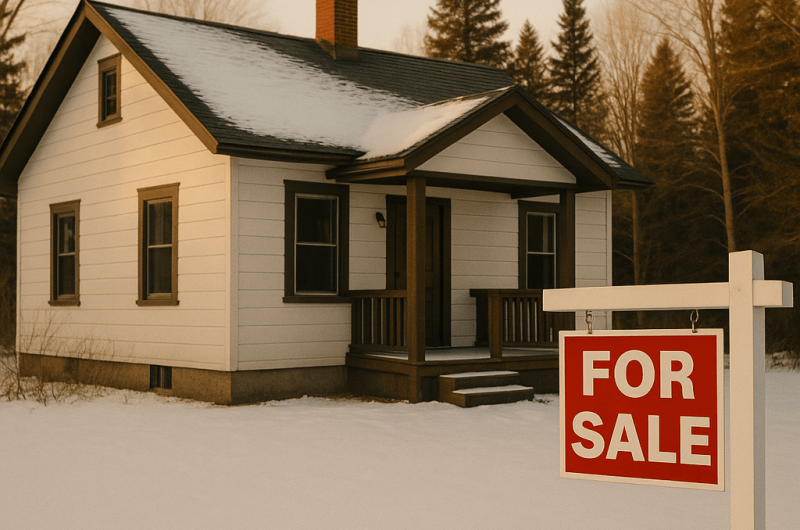Rethinking ‘Affordable’: The Case for ‘Attainable’ Housing in Marquette

Marquette, Michigan, like many communities across the country, grapples with a significant challenge: providing adequate housing for its residents. While discussions often center around “affordable housing,” this term can be misleading and confusing. To address the housing crisis more effectively, we need to shift our focus from “affordable” to “attainable” housing1, a concept that better reflects the economic realities and needs of our community.
Understanding the Terminology
The traditional definition of affordable housing, which states that housing costs should not exceed 30% of a household’s income, faces significant challenges in Marquette, Michigan. With a median household income of approximately $44,000, this definition becomes problematic and largely ineffective.
The high costs of new home construction and existing housing prices render what is labeled as “affordable” out of reach for many residents. This situation is particularly concerning given that the median income level cannot support home ownership, indicating a fundamental flaw in the application of this affordability metric to Marquette’s housing market.
The consequences of this disparity between income and housing costs are far-reaching. The majority of residents are forced into the rental market, where the situation is equally challenging. For lower-income families and service workers, the 30% threshold for affordability is often exceeded by a significant margin.
For example, a worker earning $24,000 annually would need to allocate 56% of their monthly wages to afford a one-bedroom apartment at the median rate of $900 per month. This disparity underscores the inadequacy of the current affordability definition, especially for those at lower income levels, where allocating even 30% of income to housing can be a significant financial burden.
The Case for ‘Attainable’ Housing
The concept of “attainable housing” offers a more nuanced and realistic approach to addressing housing challenges in Marquette, particularly given the limitations of the traditional “affordable housing” model. With a median income of around $40,000, the conventional 30% affordability threshold fails to provide meaningful housing options for many residents.
The term “attainable” emphasizes not just financial feasibility but also the practical realities and long-term consequences of housing costs on lower-income households. This shift in terminology represents a more holistic view of housing accessibility, considering factors beyond mere affordability to encompass the overall achievability of stable housing for diverse income levels within the community.
The concept of attainable housing also aims to address how the cost of living in a given area, including essentials like food and utilities, tends to be relatively fixed regardless of an individual’s income level. This fixed nature of expenses means that as income decreases, the proportion of income required for basic necessities increases, often exceeding the traditional 70% of one’s income that would be left by the affordable housing model.
Consequently, lower-income households may find themselves allocating significantly more than 30% of their income to housing alone, leaving insufficient funds for other essential expenses and highlighting the inadequacy of the 30% benchmark as a universal measure of affordability.
The economic realities in Marquette further underscore the need for this paradigm shift. With new single-family home construction costs averaging around $400,000 (excluding land), the gap between housing prices and local incomes has become insurmountable for many. The rental market similarly reflects this disparity, with rates often exceeding what’s genuinely affordable for service economy workers.
By adopting the concept of attainable housing, policymakers and developers can focus on creating housing solutions that not only meet the 30% income threshold but also realistically align with the financial capacities of Marquette’s residents. This approach aims to address the broader implications of housing costs on quality of life and community stability, moving beyond theoretical affordability to practical attainability.
To illustrate the importance of attainable housing, consider a typical middle-income family in Marquette: a nurse and a teacher with two children, earning a combined annual income of $80,000. Under the traditional “affordable housing” model, this family should spend no more than $2,000 per month on housing (30% of their income).
However, in Marquette’s current market, this amount is insufficient for a suitable family home, leaving little for other essential expenses like childcare, healthcare, and savings. An attainable housing approach would consider the family’s total financial picture, including profession-specific challenges like student loan debt and the need for proximity to work.
It might involve developing mixed-income neighborhoods with a range of housing options, allowing the family to find a home that meets their needs without excessive financial strain.
Moving Forward
To address Marquette’s housing challenges and shift towards an attainable housing model, a multifaceted approach involving policy reforms, financial incentives, and community engagement is necessary. Implementing zoning reforms to allow for more multi-family units and accessory dwelling units (ADUs) can increase housing supply and reduce costs, making housing more attainable for low and middle-income families.
Simultaneously, providing tax incentives, or grants to developers focused on attainable housing can stimulate the construction of quality homes that meet community needs. Long-term sustainability can be achieved through the establishment of community land trusts (CLTs), which manage land for attainable housing and prevent speculative development, meaning, land dedicated to affordable housing development will stick to that purpose.
These measures, when implemented cohesively, can help transform Marquette’s housing landscape to better serve its residents across various income levels.
References
1Community discussions around housing: Explaining common key terms by Tyler Augst, Michigan State University.





It is heartening to know there are young people willing to dig into the pernicious housing “attainability” issues. It is also heartening to consider business students devoted to solving community problems rather than seeking personal aggrandizement.
I love that a high school senior wrote this article. Rethink the business degree and go to school for something more profitable with your intelligence. My short take on this topic is that wages need to rise rather rapidly. Nurses down state make more than 80 thousand a year. If this is all the area is willing to pay we will always have a problem with retaining population. Government grants are a solution. A solution that creates have and have nots and that is how we got to the position we find ourselves in today.
Agree. The best part about hitting your head against a brick wall is it feels so good when you stop:)
This is such a well written piece. One can tell that much thought was put into it…..even before it was written. It is well above the level expected from a senior high school student….perhaps even above that of a collage writing class student. Whatever Roenak decides to pursue, he should be encouraged to continue to develop his writing skills.
One of the challenges living in Gwinn / Forsyth Township is that they only allow one home per lot by code. I have 2.5 acres and could easily have 3 or 4 ‘tiny’ homes – likely pre-built – clustered together with a common septic system; each home would only one bedroom. If zoning laws would be more flexible I believe we could not only add more homes but rented out at an affordable rate of $800 a month or about 20% of the average $44,000 income in Marquette.
Excellent article, Roenak! Extremely well researched and written
This is a very well written article regarding Marquette’s housing challenges and what can be implemented to address the issue so people are not priced out of the market. Government grants do not necessarily create dependency, and often create an opportunity to better yourself. People who dream of owning a house can start to save for that down payment if theyr’re not spending a majority of their income on rent.
Holy hell, this is a great, considered article on the problem of the WESTERN WORLD, housing has been moved into an investment section of life rather than a home for people living in a house. i’m from the UP, went to northern for 2 years in the 1960’s have a small cabin in Keewanaw, but live in Australia much of the time. Australia’s housing pricing and UNAFFORABILITY of homes is really even much worse than in the US. Here in Australia property developers get paid negative gearing from taxpayers as well as get capital gains tax. So it is skewed towards investors not people wishing to buy homes to live in. However Marquette in the past few years with the moneyed retirees moving up to the UP from the south especially Texas, has fuelled price increases significantly. 8 years ago Marquette was fairly affordable for housing now its not. Great article and I will send it to the Victorian government here in Australia who are trying to sell off “community housing” to allow those sites to be redeveloped by private developers. Dr. Tom Forsell
What an excellent article….thoughtful, well written, and accurate to the needs of our community. So encouraging to see it was written by Roenak, a high school senior. He has clearly put a ton of thought and research into this. I hope some decision makers read his words and consider some of what he has proposed for change.
This is outstanding! Great insight Roenak!
For a senior, this is so well- written and spot on! Thank you for showing the reality Marquette faces in terms of affordable, accessible housing at all income levels. Well done!
Great article!
This is such a good article!!! We need to get him some sort of recognition for his hard work and research? Awesome job, kid.
This is special. Great job Roenak Ghiardi. I’d like to offer you a full scholarship.
Wow. My dewgong dragon player is really smart outside of basketball! Good job kid. Now you can start.